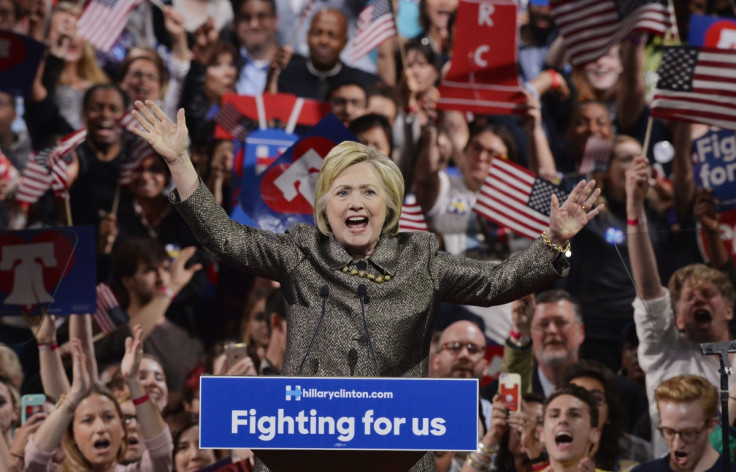Acela Primary results: Sanders pulls surprise win in Rhode Island robbing Clinton of 5-state sweep

It was a crucial night for the Democrat presidential candidates with five primary states on the line and 384 delegates up for grabs. Party frontrunner Hillary Clinton was denied a five-state sweep after her rival Bernie Sanders unexpectedly took home a victory in Rhode Island. Nevertheless, Clinton's wins left her with at least 90% of the delegates needed to win the nomination, when superdelegates are counted.
Maryland (95 delegates)
Maryland was the first state called for Clinton, but one of the last to begin supplying results. Early in the day, a judge ruled that four polling locations in Baltimore had opened late, thus forcing polling to remain open an hour later. With 92% of the results reporting, Clinton held a sizeable lead against Sanders, 63.1% to 33.0%. Of the state's 95 available delegates, 53 had been allocated to Clinton and 24 to Sanders. Another 18 delegates were not allocated at time of publishing.
Delaware (21 delegates)
Delaware was the second race to be called, another victory for Clinton. The First State, which released all of its results just three hours after polls closed, saw Clinton nab 59.8% of the vote compared to Sanders' 39.2%. With 100% of the results reporting, Clinton was awarded 12 of the state's 21 delegates and Sanders was awarded nine delegates.
Pennsylvania (189 delegates)
The night's biggest prize, Pennsylvania, was called as Clinton's third victory of the night. With 91% of the results reporting in the Keystone, Clinton led 55.7% to Sanders' 43.4%. Of the state's 189 delegates, Clinton was awarded 91 and Sanders was allocated 59. The remaining 39 delegates were not allocated at the time of publishing.
Rhode Island (24 delegates)
Sanders' first and only win came when the fourth state of the night, Rhode Island, was called at 9.11pm EDT/2.11am BST. With 100% of the results reporting, Sanders won with a nearly 12 point lead, 55.0% to 43.3%. Of the state's 24 delegates, Sanders took 13 and Clinton grabbed 11. While Clinton was expected to win in the Ocean State, polls prior to the primary revealed she only held a minor single digit lead over Sanders.
Connecticut (55 delegates)
The most contentious state of the night was Connecticut, which was too close to call for a majority of the night. Sanders held on to an early lead for much of the night, but the race was officially called for Clinton at 10.31pm EDT/3.31am BST. The win was Clinton's fourth and final win of the night. With 94% of the results reporting, Clinton led 51.2% to 47.0%. Of the state's 55 delegates, 27 delegates were allocated to Clinton and 24 for Sanders. The remaining four delegates were not allocated at the time of publishing.
With her four victories, Clinton's delegate lead jumped to 1,622 to Sanders' 1,282. However, her lead jumps to 2,141— just shy of the 2,383 delegates needed for the nomination — to Sanders' 1,321 when superdelegates are counted. The two remaining Democratic candidates will face off once again on 3 May in Indiana and on 10 May in West Virginia.
© Copyright IBTimes 2025. All rights reserved.





















